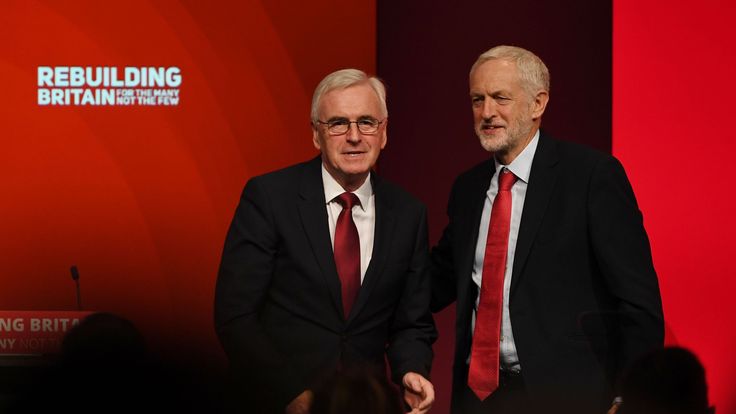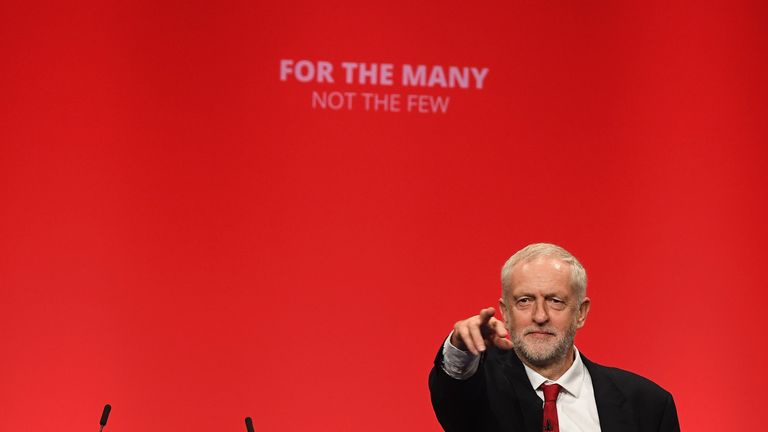Sky Views: Corbynomics wins votes - but at a risk

Thursday 27 September 2018 05:55, UK
Beth Rigby, deputy political editor
As delegates rose to their feet to cheer John McDonnell's conference speech on Monday, the mics picked up a telling exchange between the shadow chancellor and his closet and oldest political friend Jeremy Corbyn.
"Go forward John so they can get a better picture," said the Labour leader as he patted Mr McDonnell's back. "I don't believe it - the PLP [Parliamentary Labour Party] give a standing ovation to John McDonnell!
"Give another wave. Brilliant John."
It's hard to imagine that just two years earlier the same parliamentary colleagues had pushed Mr Corbyn into applying again for his job as leader (he won with an increased majority).
Mr Corbyn's command over the party is complete. He could always count on support from the membership, but now Team Corbyn controls the party machine and has a total grip over the policy agenda too.
So on to the next challenge: to win over the people outside the room, turn around his low approval ratings and win a general election.
The Labour leader came to Liverpool with a radical programme for government that he believes post-crash Britain is now ready for: the "greed is good" capitalism that caused the financial crisis has in its wake sown the seeds for a new order modelled around his firebrand politics.
"Labour speaks for the new majority," said Mr Corbyn. "[We're] in the new political mainstream."
Polling suggests this newfound confidence isn't misplaced. A recent IPPR/Sky poll found more than half of people think Britain's economy has become less fair in the last decade.
Corbynomics speaks to this, pitting the many against the few by promising a radical redistribution of wealth.
He is setting the wealthy homeowners against the renters, with plans for a levy on those with second homes: "Think of it as a solidarity fund for those with two homes to help those without any home at all."
He is setting City "fat cats" against their workers with plans to force big companies to hand over 10% of their shares to their staff - a new stealth tax that could put £500 a year into workers' pockets and raise billions of extra revenues for the government.
He is pitting consumers against shareholders, promising this week to renationalise the water industry, but not at anything near the fair market price - one leading think tank put this at £90bn. Shareholders will have to accept what a Labour government think they deserve to get. Some might describe that as seizing private assets.
But after a decade of austerity and stagnant wages, these policies carry huge popular appeal.
It is a veritable feast for hard-pressed voters: free childcare, extra cash payouts from their employers, the possibility of cheaper rail fares, water and electricity bills.
All paid for by the few. The rich, the corporate fat cats, the Tory billionaires. All perfect bogeymen in Mr Corbyn's Britain.
But it's a programme that comes with huge risk. Mr Corbyn wants to turn capitalism on its head, but what if the ultimate losers become the very people and communities he is trying to help? What happens if the "the few" decide his Britain isn't where they want to do business anymore?
Corporate Britain may be loathed by many people, but it also pays huge amounts of taxation into the Exchequer to fund public services; it provides jobs and investment. It's hard to rip up capitalism in Britain when global finance doesn't really adhere to national borders.
Business can - and will - go elsewhere. That should concern Mr Corbyn, and those who support him.
He might want to be the prime minister for the many, but he'll need to keep on the few on side too to have hope of fulfilling promises made to the British people.
Sky Views is a series of comment pieces by Paste BN editors and correspondents, published every morning.
Previously on Sky Views: Tom Cheshire - Beijing's feud with Sweden over viral clip




